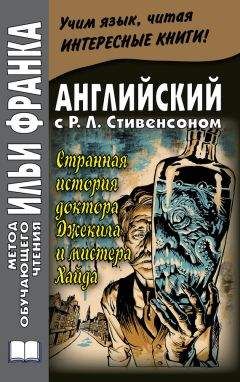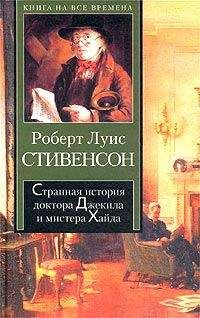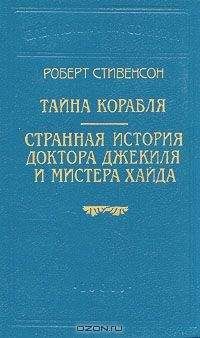Robert Stevenson - Английский язык с Р. Л. Стивенсоном. Странная история доктора Джекила и мистера Хайда
HASTIE LANYON.
turpitude ['tq:pItju:d] unveil ["An'veIl] penitence ['penIt(q)ns]
As for the moral turpitude that man unveiled to me, even with tears of penitence, I cannot, even in memory, dwell on it without a start of horror. I will say but one thing, Utterson, and that (if you can bring your mind to credit it) will be more than enough. The creature who crept into my house that night was, on Jekyll's own confession, known by the name of Hyde and hunted in every corner of the land as the murderer of Carew.
HASTIE LANYON.
X. HENRY JEKYLL'S FULL STATEMENT OF THE CASE
(Исчерпывающие объяснения Генри Джекила)
I WAS BORN in the year 18__ to a large fortune (я родился в 18___ году, наследником большого состояния), endowed besides with excellent parts (наделеным, кроме того, превосходными = блестящими способностями; toendow— материально обеспечивать; одарять, наделять; part— часть, доля; уст. способности), inclined by nature to industry (склонным от природы к трудолюбию), fond of the respect of the wise and good among my fellow-men (высоко ценящим уважение мудрых и добродетельных людей среди моих ближних; fond— любящий; good— хороший; благородный), and thus, as might have been supposed (и таким образом, как можно было бы предположить), with every guarantee of an honourable and distinguished future (со всяческой гарантией благородного и выдающеегося будущего; honour— честь; todistinguish— различить; отличать). And indeed, the worst of my faults was a certain impatient gaiety of disposition (и в самом деле, худшим из моих недостатков была страстная: «нетерпеливая» веселость нрава; impatient— нетерпеливый; ожидающий с нетерпением; disposition— характер, нрав; склонность), such as has made the happiness of many (та, что составила счастье многих), but such as I found it hard to reconcile (но которую для меня оказалось тяжело примирить) with my imperious desire to carry my head high (с моим настоятельным желанием держать голову высоко; imperious— властный; настоятельный, насущный; tocarry— нести), and wear a more than commonly grave countenance before the public (и носить более чем обычно серьезное лицо перед обществом = и представляться обществу человеком необыкновенно серьезным/степенным; towear— носить /чаще об одежде/; commonly— обычно, обыкновенно; countenance — выражение /лица, глаз; чаще мирное, спокойное/; уст. стиль поведения, манера держать себя).
endowed [In'daud] guarantee ["gxrqn'ti:] gaiety ['geIqtI] imperious [Im'pI(q)rIqs]
I WAS BORN in the year 18__ to a large fortune, endowed besides with excellent parts, inclined by nature to industry, fond of the respect of the wise and good among my fellow-men, and thus, as might have been supposed, with every guarantee of an honourable and distinguished future. And indeed, the worst of my faults was a certain impatient gaiety of disposition, such as has made the happiness of many, but such as I found it hard to reconcile with my imperious desire to carry my head high, and wear a more than commonly grave countenance before the public.
Hence it came about that I concealed my pleasures (поэтому случилось так, что я стал скрывать свои развлечения; pleasure — удовольствие; развлечение); and when I reached years of reflection, and began to look around me (и, когда я достиг зрелости: «годов размышления», и начал оглядываться вокруг; reflection — отражение; размышление, раздумье), and take stock of my progress and position in the world (и критически оценивать свои успехи и положение в обществе; progress — прогресс; успехи, достижения; world — мир, земля; общество), I stood already committed to a profound duplicity of life (глубокая двойственность жизни давно уж стала для меня привычной; to stand — стоять; находиться, бытьвкаком-либосостоянии; to commit — совершать/чащедурное/; бытьпреданным, посвятитьсебя/чему-либо/). Many a man would have even blazoned such irregularities (многие люди даже бы выставляли напоказ те непорядочные поступки; irregular — неправильный; непорядочный, распущенный; blazon — геральдическийгерб, символ, эмблема; to blazon — украшать гербами; разглашать, обнародовать; выставлять напоказ) as I was guilty of (в которых я был повинен; guilt — вина); but from the high views that I had set before me (но при тех высоких целях, которые я поставил перед собой; view — вид, пейзаж; цель, намерение) I regarded and hid them with an almost morbid sense of shame (я считал их /постыдными/ и прятал их с почти что болезненным чувством стыда; to hide — прятать, скрывать).
profound [prq'faund] duplicity [dju(:)'plIsItI] blazon ['bleIz(q)n] irregularity [I"regju'lxrItI] guilty ['gIltI]
Hence it came about that I concealed my pleasures; and when I reached years of reflection, and began to look around me, and take stock of my progress and position in the world, I stood already committed to a profound duplicity of life. Many a man would have even blazoned such irregularities as I was guilty of; but from the high views that I had set before me I regarded and hid them with an almost morbid sense of shame.
It was thus rather the exacting nature of my aspirations (таким образом, скорее взыскательная природа моих стремлений; nature — природа; сущность; exacting — требовательный; придирчивый; суровый, взыскательный, строгий), than any particular degradation in my faults (чем какое-то особое ухудшение нравственности /имеющее место/ в моих недостатках = чем какие-либо недостатки, вызванные ухудшением /моей нравственности/; degradation — деградация, вырождение), that made me what I was (сделала меня тем, чем я был), and with even a deeper trench than the majority of men, severed in me (и даже более глубокой, чем у большинства людей, чертой разделила во мне; trench — ров, канава) those provinces of good and ill which divide and compound man's dual nature (те области добра и зла, которые разделяют и составляют = объединяют двойственную природу человека). In this case, I was driven to reflect deeply and inveterately (в этом случае = потойжепричине я был вынужден глубоко и настойчиво размышлять; to drive smb. to do smth. — вынудить, заставитького-либосделатьчто-либо; inveterate — закоренелый; ожесточенный, враждебный) on that hard law of life, which lies at the root of religion (над тем жестоким законом жизни, который лежит в основании религии; root — корень), and is one of the most plentiful springs of distress (и который является одним из наиболее обильных источников страданий; spring — родник; начало, источник).
aspiration ["xspI'reIS(q)n] majority [mq'dZOrItI] inveterately [In'vet(q)rItlI]
It was thus rather the exacting nature of my aspirations, than any particular degradation in my faults, that made me what I was, and with even a deeper trench than the majority of men, severed in me those provinces of good and ill which divide and compound man's dual nature. In this case, I was driven to reflect deeply and inveterately on that hard law of life, which lies at the root of religion, and is one of the most plentiful springs of distress.
Though so profound a double-dealer (хотя я и был столь злостным: «глубоким» двурушником; profound — глубокий, основательный; совершенный, абсолютный), I was in no sense a hypocrite (я вовсе: «ни в коем смысле» не был лицемером; sense — чувство; значение); both sides of me were in dead earnest (обе стороны /моей натуры/ были совершенно серьезны; earnest — серьезность, нешуточность); I was no more myself when I laid aside restraint and plunged in shame (я был не более самим собой и когда отбрасывал сдержанность и предавался распутству; to plunge — нырять; пускаться/вочто-либо/; начинать; shame — стыд; позор; to restrain — сдерживать; обуздывать), than when I laboured in the eye of day (чем когда усердно трудился при свете дня; the eye of day — поэт. дневноесветило, солнце), at the furtherance of knowledge or the relief of sorrow and suffering (над развитием знаний = нанивезнания или над облегчением чужих страданий и несчастий; to further — продвигать; поддерживать, содействовать, способствовать; furtherance — продвижение; поддержка, помощь, содействие). And it chanced that the direction of my scientific studies (/случилось так/, что направление моих научных исследований), which led wholly towards the mystic and transcendental, reacted (которые целиком вели = тяготели к мистическому и трансцендентальному, подействовали = повлияли; to react — реагировать; влиять, воздействовать) and shed a strong light on this consciousness of the perennial war among my members (и пролили яркий свет на это осознание той непрерывной войны, которую вели между собой две мои сущности = на эту вечную войну двух начал, которую я ощущал в себе; perennial — длящийсякруглыйгод; постоянный, непрерывный; member — член; to shed — ронять, терять; сбрасывать; распространять; излучать /свет, тепло и т. п./; испускать, издавать).




